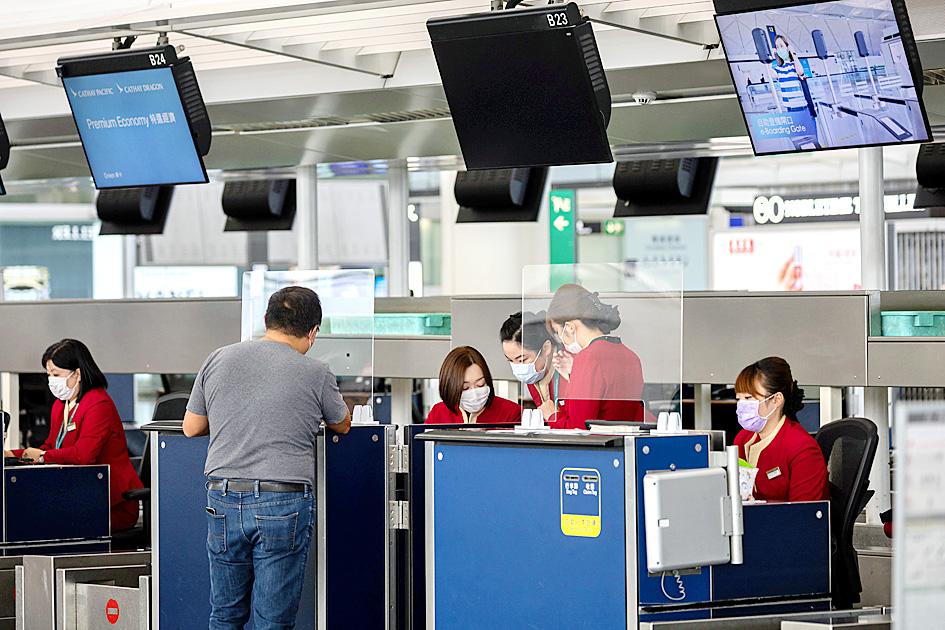Cathay Pacific Airways Ltd (國泰航空) hopes a recovery in travel demand would allow it to operate closer to 50 percent of its pre-pandemic capacity later next year, provided there is an effective COVID-19 vaccine widely adopted in its key markets.
The Hong Kong-based carrier expects to operate at about 10 percent of typical capacity for the rest of this year and well below one-quarter in the first half of next year, chief customer and commercial officer Ronald Lam (林紹波) said in a statement yesterday as the airline released another bleak set of monthly passenger figures.
“Among the multiple scenarios studied, this one is already the most optimistic that we can responsibly adopt at this moment,” Lam said of the capacity forecasts.

Photo: EPA-EFE
The airline and its Cathay Dragon (國泰港龍) unit flew just 47,061 passengers last month, down 98.1 percent from a year earlier.
The two operated 1,283 flights during the month, compared with 19,292 in September last year.
The duo’s passenger load factor was only 24.9 percent. They carried 109,453 tonnes of cargo and mail last month, decreasing by 36.6 percent.
Cathay is expected to unveil details of a strategic review soon, with some reports suggesting job cuts could be announced as early as this week.
The company, which posted a HK$9.9 billion (US$1.3 billion) loss in the first half, has for months been working on the review as it struggles to get through the COVID-19 crisis, which it has called the most challenging period in its history.
“September rounded off what has been an incredibly difficult summer, traditionally the peak passenger travel season of the year,” Lam said yesterday.
Cathay operated at 9 percent capacity during the month, up from 8 percent in August.
Passenger numbers averaged just 1,568 last month, Lam said.

Application-specific integrated circuit designer Faraday Technology Corp (智原) yesterday said that although revenue this quarter would decline 30 percent from last quarter, it retained its full-year forecast of revenue growth of 100 percent. The company attributed the quarterly drop to a slowdown in customers’ production of chips using Faraday’s advanced packaging technology. The company is still confident about its revenue growth this year, given its strong “design-win” — or the projects it won to help customers design their chips, Faraday president Steve Wang (王國雍) told an online earnings conference. “The design-win this year is better than we expected. We believe we will win

Intel Corp chief executive officer Lip-Bu Tan (陳立武) is expected to meet with Taiwanese suppliers next month in conjunction with the opening of the Computex Taipei trade show, supply chain sources said on Monday. The visit, the first for Tan to Taiwan since assuming his new post last month, would be aimed at enhancing Intel’s ties with suppliers in Taiwan as he attempts to help turn around the struggling US chipmaker, the sources said. Tan is to hold a banquet to celebrate Intel’s 40-year presence in Taiwan before Computex opens on May 20 and invite dozens of Taiwanese suppliers to exchange views

Chizuko Kimura has become the first female sushi chef in the world to win a Michelin star, fulfilling a promise she made to her dying husband to continue his legacy. The 54-year-old Japanese chef regained the Michelin star her late husband, Shunei Kimura, won three years ago for their Sushi Shunei restaurant in Paris. For Shunei Kimura, the star was a dream come true. However, the joy was short-lived. He died from cancer just three months later in June 2022. He was 65. The following year, the restaurant in the heart of Montmartre lost its star rating. Chizuko Kimura insisted that the new star is still down

While China’s leaders use their economic and political might to fight US President Donald Trump’s trade war “to the end,” its army of social media soldiers are embarking on a more humorous campaign online. Trump’s tariff blitz has seen Washington and Beijing impose eye-watering duties on imports from the other, fanning a standoff between the economic superpowers that has sparked global recession fears and sent markets into a tailspin. Trump says his policy is a response to years of being “ripped off” by other countries and aims to bring manufacturing to the US, forcing companies to employ US workers. However, China’s online warriors